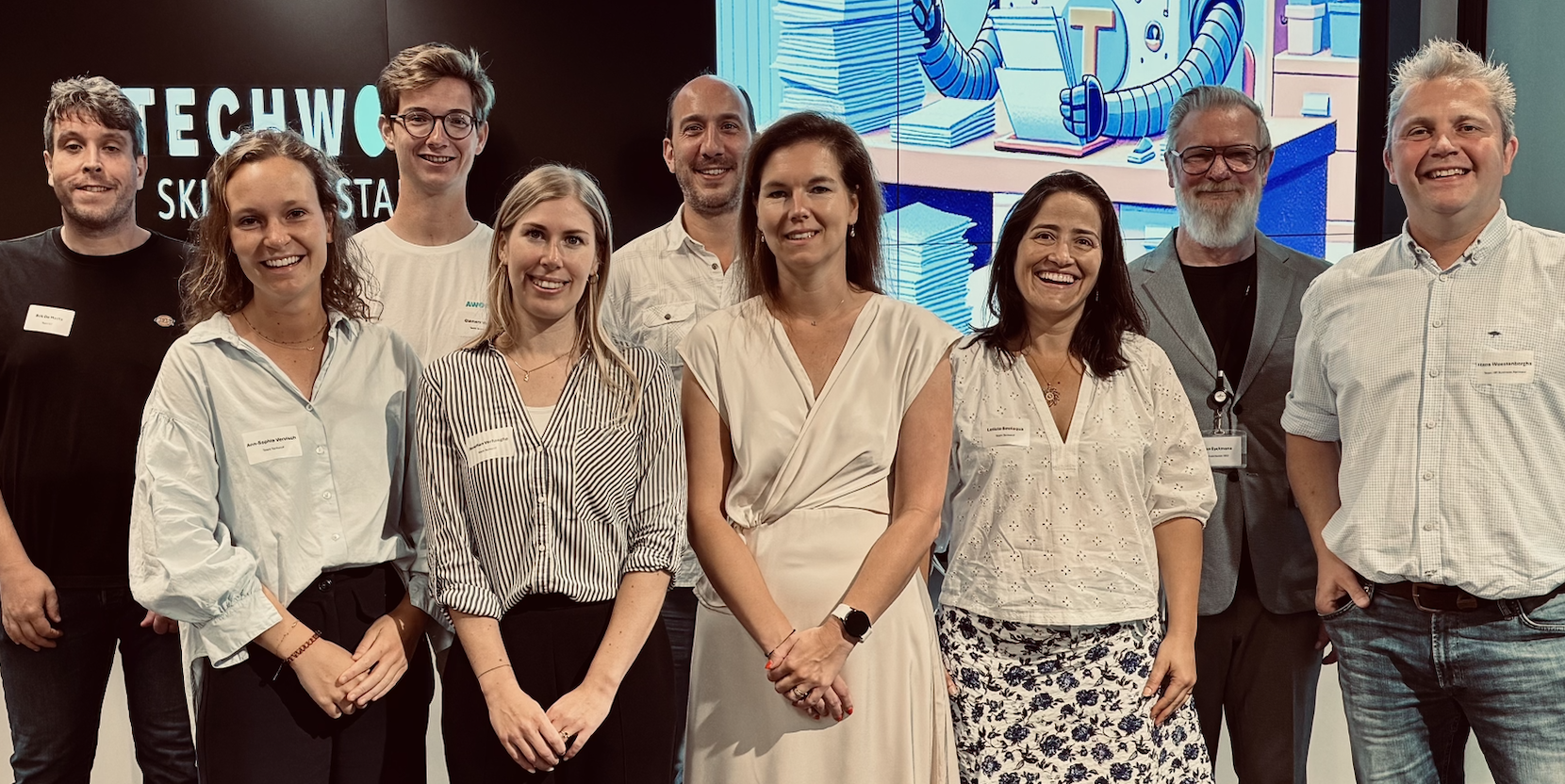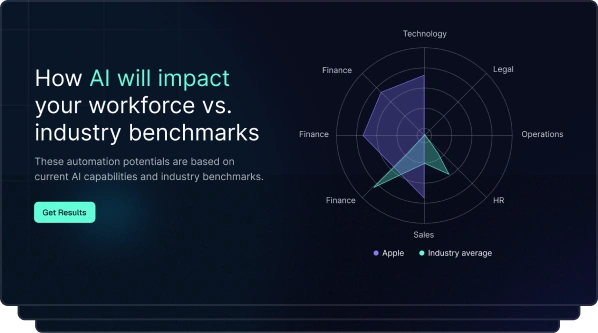How TechWolf Helped the Belgian Government Build a Skills-Informed Workforce


How the Belgian Government unlocked rapid skills visibility and internal mobility with TechWolf
Through its collaboration with TechWolf, the Belgian Federal Public Service for Health gained a unified, multilingual skills view across its workforce, enabling faster crisis response, transparent mobility, and data-driven talent decisions.
of employees with verified skills profiles
AI-inferred profiles were created and validated across the workforce, giving leaders and teams a shared, data-driven view of skills for the first time.
of translators mapped to options as translation work declined
With translation volume dropping due to AI tools, the team used verified skills profiles to identify potential roles that aligned with each employee’s strengths.
languages, 1 compliant data foundation
TechWolf integrates securely with existing HR systems and data in Dutch, French, and English, ensuring full GDPR compliance and transparent governance from day one.

Overview
The Belgian Federal Public Service for Health faced a problem that every large organization quietly wrestles with:
They had no idea what skills lived inside their walls.
When COVID-19 hit, that blind spot became a crisis. Finding people with the right expertise meant frantic calls, spreadsheets, and guesswork, not data.
So they decided to fix it for good.
Together with TechWolf, the federal service built a living map of its workforce. One that doesn’t rely on self-reported surveys but on real work data. Within months, 70% of employees had verified their AI-inferred profiles, giving leaders visibility into skills they’d never seen before.
The result? Faster crisis response, transparent internal mobility, and even the test to redeploy 35 translators whose work will be automated, proving that skills intelligence isn’t just a private-sector luxury, but a public-sector necessity.
As Carolien said on our TechWolf Podcast:
It was impossible to know from all our employees what their skills are, what their strengths are in our organization. (...) Now we can go directly to the person with the right skills to use in our project team.”
Carolien Sonck, Director of Support Services, Belgian Government
From spreadsheets to skills intelligence
After the COVID crisis, Carolien and her team began exploring how to build a skills-informed organization. Through BOSA, the federal innovation lab, they discovered TechWolf.
Carolien recalls: “When they showed us the dashboards, we were fully engaged. We said, ‘Yes, that’s the solution to our problem.’”
TechWolf was selected to help the federal service of Health map, manage, and optimize the skills of its workforce. The goal was to create a living, data-driven picture of what every employee could do, inferred automatically from their HR data.
To build that picture, we connected to the government’s existing HR data sources: performance files, job descriptions, and training records. Our AI combined those sources across multiple languages (Dutch, French, and English), reflecting the multilingual reality of the Belgian administration. All data sources were selected jointly with the organization to guarantee data privacy, transparency, and compliance with GDPR and the EU’s ethical AI principles.
Once the data foundation was in place, we turned to integration. The TechWolf platform connects securely to existing HR technologies such as SAP SuccessFactors, learning portals, and workforce planning tools. This integration ensures that the inferred skills data flows seamlessly across the HR ecosystem and stays continuously updated, without requiring employees to input data manually.
The result is a dynamic skills inventory that helps the organization plan projects, mobilize talent, and align learning and career opportunities, all while keeping employees in control of their own profiles.
“We are not doing something new, we are doing it better.”
The first phase focused on the critical use cases that matter most to government: crisis response and internal mobility.
“It’s almost a year and a half that we have been working with TechWolf,” Carolien said during our podcast conversation. “We started with the crisis use case to find people with specific skills quickly, but we also focused on internal mobility.”
Like many organizations, the Belgian Government must do more with less. Instead of relying solely on recruitment, Carolien’s team now uses TechWolf dashboards to identify internal talent with the right skills for new projects.
When we start a project, we need a well-defined set of skills. Is there somebody who knows change management? GDPR? Power BI? Before, we’d say, ‘I think someone can do that.’ Now, we can check the TechWolf data and know for sure: that person has the skill.”
Carolien Sonck, Director of Support Services, Belgian Government
By the first go-live, around 70 percent of employees had already reviewed and approved their profiles, validating or editing the AI-inferred data.
“We can show them what we can do with the skills profile,” Carolien said. “When there is a new vacancy, the data encourages them to apply for certain jobs.”
From translators to talent redeployed
A small but meaningful proof of impact came very soon after and from an unexpected source: the government’s team of translators.
Before, we had 35 people who were translating,” Carolien explained. “But now with AI, everybody is using Co-Pilot, DeepL, or other applications. So that means that we have 35 people, but they don’t need to do as many translations as before anymore.”
Instead of leaving these employees uncertain about their future, the public service used their TechWolf skills profiles to identify where their abilities could be redeployed.
“We said, these are 35 people. With their skills profiles, what is the function that relates the most to their skills? We did a use case where we went to them and said, ‘Based on your skills profile, we think that this function is a possibility for you.’”
Before TechWolf, employees had to search the vacancy list themselves, “do it yourself,” as Carolien put it. “And now we can nudge them a little. We can say, there is maybe a possibility to find a function that’s really very close to your skills profile.”
This early win became a turning point, proving that workforce data can create real internal mobility and resilience, even in government.
Communication and trust as foundations
Introducing AI into HR data always raises valid concerns, especially in public sector environments. We worked closely with Carolien’s team to ensure full transparency, privacy, and trust at every stage.
We very quickly went to the workers’ councils,” Carolien recalls. “We explained the why. Why are we doing it? What’s in it for the employees? We showed the dashboards, the data sent to TechWolf, and they saw it’s all anonymized. TechWolf doesn’t know if it’s Carolien, Ben, or John. They know it’s person one, two, three. That reassured them.”
Her team also led a strong internal communication plan: intranet news, Teams channels, union meetings, and open Q&As.
“It’s very important to tell people what we are doing with their data and what is in it for them,” she said. “If we know what their skills are, we can say, you can follow training to improve, or there are interesting functions. Isn’t it nice to go and try another function?”
By combining transparent communication with secure data practices, the project turned initial hesitation into widespread belief in the value of skills data.
Building the bridge between HR and innovation
The success of the initiative came from a truly cross-functional team.
“We have the project lead, who formerly worked in communications. We have HR, because the use cases are coming from them. We have IT and ICT, and we have our data expert, who’s doing magic things with Power BI.”
That combination of HR, data, and technology expertise turned our AI into practical, explainable insights. Together, we built a foundation that not only meets GDPR and AI Act standards but also demonstrates how human-centered AI can support public organizations responsibly.
In the beginning, they didn’t believe in the project. They said, another AI project, another firm doing something with our data. But now we are showing the results. It’s not a publicity stunt. We can show the dashboards and the use cases, and that makes all the difference.”
Carolien Sonck, Director of Support Services, Belgian Government
A vision for the future
The Belgian Government’s journey is still young, but the ambition is already expanding.
“I hope that we can do an RFP for the whole federal government,” Carolien said. “So we can have 60,000 skills profiles and switch easily from one organization to another. That would be a dream for me that’s coming true.”
For us at TechWolf, this partnership shows what’s possible when organizations, even in the most regulated environments, start treating skills as living data rather than static records.
Let’s get talking
We believe great conversations lead to great solutions. Let’s connect and see how we can help.




